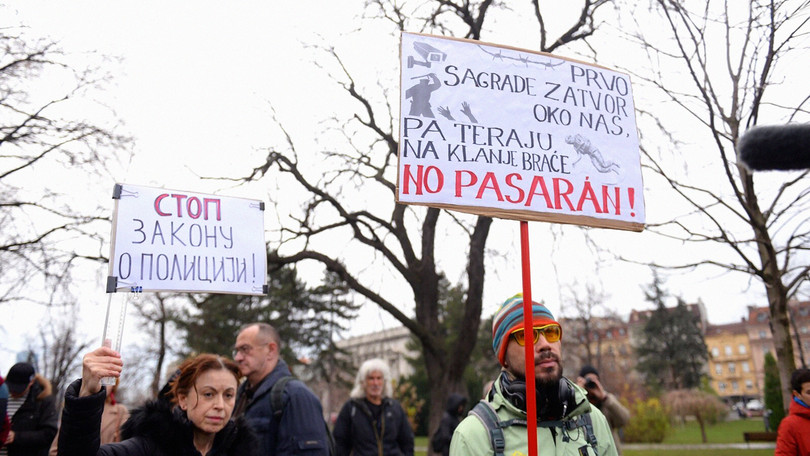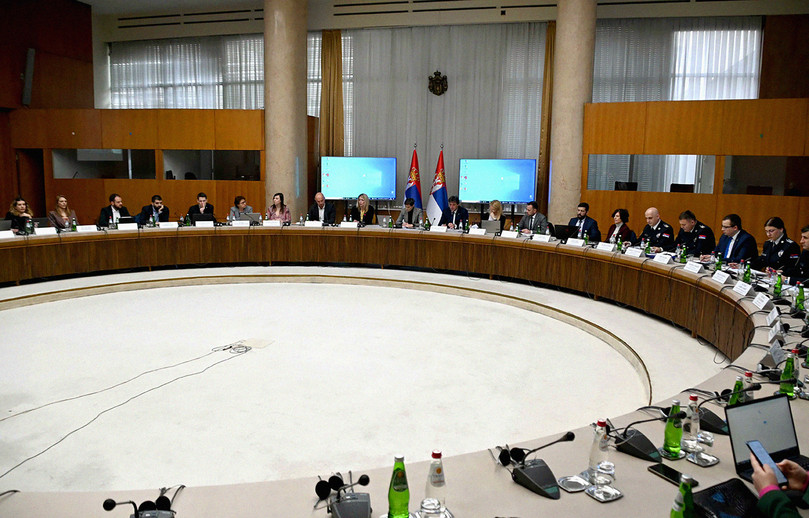Serbia’s controversial draft law on policing has shortcomings for combating organized crime.
The third effort to reform legislation on policing in Serbia since 2000 has caused much public outcry.1 Civil society objections to the legislation centre on the possibility that it would allow the police to enter a private residence without a court order, lead to the introduction of mass biometric video surveillance, ban the recording of police officers seen violating the law and permit police the use of excessive force.2 Moreover, with increased power given to the interior minister, the law contains some setbacks for the fight against organized crime. Efforts to revise the legislation should therefore be welcomed.
The negative public reaction to the proposed Draft Law on Internal Affairs was so strong that the government has decided to hold wide-ranging public consultations on the draft, a relatively unusual step for Serbia.3 In January 2023, the first consultations between the government and civil society took place. This dialogue helped to improve the draft law and build trust between the criminal justice sector and civil society.4 As a result of the dialogue, two of the initial resolutions were dropped: the proposal that police should be allowed to enter a private residence without a court order and the motion to enable the police to break up protests using sonic weapons.5

During protests in December 2022, Serbian citizens called for a halt to the draft law on policing.
Photo: Vesna Anđić via RFE/RL
A positive aspect of the law is that it further specifies and delineates internal police responsibilities and duties. Police integrity is strengthened by regulating secondary jobs, or those performed by off-duty police officers, that are incompatible with the policing profession, and anti-corruption measures (such as integrity tests and asset declarations) have also been improved.6 Parliamentary oversight of the police, crucial for maintaining police integrity, remains unchanged,7 and parliamentarians can still monitor the legality of special investigative measures, such as telecommunications interception or the use of force.8 In addition, external oversight has been enhanced through more detailed periodic publicly available reports, the right to access information of public importance and the right to file complaints.9 Police officers have also welcomed the re-establishment of the High School of Internal Affairs,10 which was closed in 2007,11 believing that secondary education will improve police professionalism and enable screening of candidates.12
However, while the draft law contains several positive aspects, there are four significant shortcomings in relation to the fight against organized crime, as the European Commission has repeatedly noted in its progress reports.13 Some of the provisions threaten police autonomy and have consequences for organized corruption, in particular.
First, instead of allowing for operational independence of the police in line with international standards,14 the draft law enables the interior minister – that is, a political figure – to issue mandatory instructions.15 This undermines the functional autonomy of the police and strengthens the position of the minister, particularly since there is no provision for the police director to refuse such an instruction or report a potential violation of the law.16
Under the current draft, the minister, rather than the police director, prescribes almost all by-laws in the policing domain, such as the application of the use of force and how police work is performed. Furthermore, the government can dismiss the director upon the minister’s proposal, even if the reasons for the dismissal are not prescribed in the draft law. This is a regression from the current law, in which dismissal is possible only if the director fails to achieve results within the competencies defined for the position.17
The draft law also provides that the police director could be someone from outside the policing profession,18 contrary to the current law.19 Therefore, security and intelligence service affiliates with the status of authorized officials and at least 15 years of experience in management positions could apply for the position of police director. This would allow someone with strong political ties to be appointed as police director.20
Secondly, the draft law indirectly undermines the subordination of the police to the prosecution in criminal investigations by specifying that police officers should carry out the orders of their superiors.21 This potentially endangers the leading role of the prosecutor towards the police, since the positions of police superior and prosecutor are sometimes different, especially in politically sensitive cases. An analysis of 200 investigations showed that, in every second case, the prosecutor had to urge the police to act on his/her orders.22
Thirdly, the draft permits the interior minister a greater role in influencing human resources, thus possibly politicizing the police. Under the draft law, the minister can also personally promote or send a police officer into early retirement.23
Finally, the draft law does not remove the possibility, present in the current law, that the interior minister can influence the work of the Internal Control Sector, an important body for preventing corruption in the police force. According to the new provisions, the minister controls the head of the sector and all employees.24 In managing the sector, the minister is allowed to form a commission whose composition and work procedures are unregulated, which poses a threat to the sector’s political, functional and operational independence.
Hopefully, the dialogue process can overcome these shortcomings in the current draft law before the revision process is finalized in late 2023.25 As noted above, the main issues to be addressed involve maintaining the operational autonomy of the police; avoiding political interference on strictly professional issues, such as human resources and working conditions; ensuring police accountability to the prosecution in criminal investigations; and guaranteeing the independence of the bodies responsible for internal police monitoring and oversight.

At the January 2023 consultations, civil society and government representatives discussed the future of policing legislation in Serbia.
Photo: Ivana Lazarević via National Convention on the European Union
The new policing regulation in Serbia is not only an opportunity to fulfil the European Commission’s recommendations, but also to show that the police force is an indispensable element of stability and security that operates on the basis of democratic principles rather than fear. The consultative process could help achieve at least one of the three democratic principles identified at the beginning of police reform in Serbia in the initial years of the 2000s: decentralization, depoliticization and demilitarization. Splitting the draft law into two separate laws – as occurred in Croatia, Slovenia and North Macedonia – could provide a model for depoliticizing the police. The first law would cover police duties, for which the police director would be accountable. The interior minister would then be responsible for implementation of the second law on legislation on internal affairs and police development.
Notes
-
Press centar UNS, KZN povodom Nacrta zakona o unutrašnjim poslovima: kakva je policija potrebna građanima Srbije, YouTube, 20 December 2022, https://www.youtube.com/live/imdP2d1cpo0; Protest u Beogradu protiv novog nacrta Zakona o policiji, Radio Free Europe, 24 December 2022, https://www.slobodnaevropa.org/a/protest-beograd-zakon-policija/32192066.html; Poslanici Evropskog parlamenta zabrinuti zbog odredbi o biometrijskom nadzoru u nacrtu zakona o unutrašnjim poslovima, European Western Balkans, 22 December 2022, https://europeanwesternbalkans.rs/poslanici-evropskog-parlamenta-zabrinuti-zbog-odredbi-o-biometrijskom-nadzoru-u-nacrtu-zakona-o-unutrasnjim-poslovima. ↩
-
PrEUgovor, Pushing and pulling: What’s wrong with the new Draft Law on Internal Affairs, Brief Alert, 6 February 2023, https://preugovor.org/Brief-Alert/1784/Pushing-and-Pulling-Whats-Wrong-with-the-New.shtml; Nataša Anđelković, Policija i Srbija: Povučen Nacrt zakona o unutrašnjim poslovima, šta je sve sporno, BBC News, 22 December 2022, https://www.bbc.com/serbian/lat/srbija-64044804. ↩
-
Interview with a civil society researcher from Serbia participating in consultations on the draft law on internal affairs, Belgrade, February 2023. ↩
-
Interview with Trpe Stojanovski, Professor at the Faculty of Security in North Macedonia, February 2023, online. ↩
-
Interview with a civil society researcher from Serbia participating in consultations on the draft law on internal affairs, Belgrade, February 2023; Ulaz policije u stanove bez naloga povučen iz Nacrta Zakona o unutrašnjim poslovima, Danas, 23 January 2023, https://www.danas.rs/vesti/drustvo/ulaz-policije-u-stanove-bez-naloga-povucen-iz-nacrta-zakona-o-unutrasnjim-poslovima. ↩
-
Draft Law on Internal Affairs, Articles 10, 11, 36, 277, 194, 195 and 196, https://www.paragraf.rs/dnevne-vesti/121222/121222-vest13.html. ↩
-
Mario Aguja and Hans Born (eds.), The Role of Parliament in Police Governance: Lessons Learned from Asia and Europe, Geneva Centre for Security Sector Governance, 2017, https://www.dcaf.ch/role-parliament-police-governance-lessons-learned-asia-and-europe; Draft Law on Internal Affairs, Article 180, https://www.paragraf.rs/dnevne-vesti/121222/121222-vest13.html. ↩
-
Marija Ignjatijević, Parliamentary oversight of the police and the EU accession process – a missing link in the fundamentals-first approach, Belgrade Centre for Security Policy, 30 November 2022, https://bezbednost.org/en/publication/parliamentary-oversight-of-the-police-and-the-eu-accession-process-a-missing-link-in-the-fundamentals-first-approach. ↩
-
Draft Law on Internal Affairs, Article 185, https://www.paragraf.rs/dnevne-vesti/121222/121222-vest13.html. ↩
-
Interview with Trpe Stojanovski, Professor at the Faculty of Security in North Macedonia, February 2023, online; Strukovno udruženje police, Srednja škola unutrašnjih poslova, 2023, https://www.sup.rs/aktivnosti/srednja-skola-unutrasnjih-poslova. ↩
-
Internal Affairs Ministry, Basic Police Training Centre, Istorijat Centra, 25 July 2008, https://www.copo.edu.rs/22-1-l. ↩
-
Interview with Trpe Stojanovski, Professor at the Faculty of Security in North Macedonia, February 2023, online. ↩
-
Serbia Report 2022, Directorate-General for Neighbourhood and Enlargement Negotiations, 12 October 2022, https://neighbourhood-enlargement.ec.europa.eu/serbia-report-2022_en; Serbia Report 2021, Directorate-General for Neighbourhood and Enlargement Negotiations, 19 October 2021, https://neighbourhood-enlargement.ec.europa.eu/serbia-report-2021_en. ↩
-
Council of Europe, Recommendation Rec(2001)10 of the Committee of Ministers to member states on the European Code of Police Ethics, 19 September 2001, https://rm.coe.int/16805e297e. ↩
-
Draft Law on Internal Affairs, Article 13, https://www.paragraf.rs/dnevne-vesti/121222/121222-vest13.html. ↩
-
PrEUgover, Pushing and pulling: What’s wrong with the new Draft Law on Internal Affairs?, Brief Alert, 6 February 2023, https://preugover.org/Brief-Alert/1784/Pushing-and-Pulling-Whats-Wrong-with-the-New.shtml. ↩
-
Law on Police, Article 149, http://www.pravno-informacioni-sistem.rs/SlGlasnikPortal/eli/rep/sgrs/skupstina/zakon/2016/6/1/reg. ↩
-
Draft Law on Internal Affairs, Article 35, https://www.paragraf.rs/dnevne-vesti/121222/121222-vest13.html. ↩
-
Law on Police, Article 149, http://www.pravno-informacioni-sistem.rs/SlGlasnikPortal/eli/rep/sgrs/skupstina/zakon/2016/6/1/reg. ↩
-
Interview with Odd Berne Malme, senior police advisor at the Norwegian police, Oslo, February 2023. ↩
-
Draft Law on Internal Affairs, Articles 49 and 185, https://www.paragraf.rs/dnevne-vesti/121222/121222-vest13.html. ↩
-
Javno tužilaštvo i policija: Izazovi tužilačke istrage, Udruženje javnih tužilaca i zamenika javnih tužilaca Srbije, December 2017, https://uts.org.rs/wp-content/uploads/2007/11/javno.tuzilastvo.i.policija.pdf. ↩
-
Draft Law on Internal Affairs, Articles 239, 261 and 347, https://www.paragraf.rs/dnevne-vesti/121222/121222-vest13.html. ↩
-
Draft Law on Internal Affairs, Article 200, https://www.paragraf.rs/dnevne-vesti/121222/121222-vest13.html. ↩
-
Ministry of European Integration, Vladavina prava u Srbiji: Presek stanja iz februara 2023, 6. ↩
